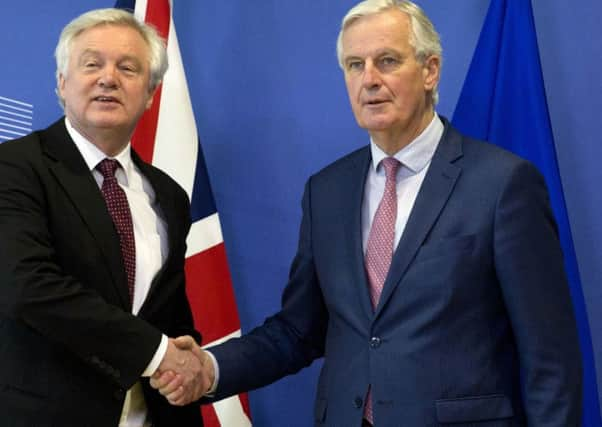Bill Carmichael: The driving force behind Brexit deal


To watch the UK’s chief Brexit negotiator and his EU counterpart smiling and shaking hands, it was hard to believe that these two have been bickering for months over the talks. You may recall the negotiations got off to a very bad start back in October when details of a private dinner at Downing Street were immediately leaked to a sympathetic German journalist.
Fingers were pointed at Barnier’s team, particularly at Jean-Claude Junker’s pugnacious protégé Martin Selmayr, although he denied being the source of the leak. The result was the talks were mired in bad faith right from the beginning.
Advertisement
Hide AdAdvertisement
Hide AdSince then Barnier and his team have treated the UK with disdain – so much so that many British observers decided that the EU was determined to wreck any prospect of a deal, even though it would be hugely advantageous to both sides.
So it is curious that the mood changed so dramatically this week, with both sides hailing significant progress in the talks. Compromise was certainly in the air. The UK gave way over keeping Britain in the Common Fisheries Policy for a limited period – something that has caused great anger among our fishing communities.
There was also an agreement that EU nationals arriving in the UK during the transition period to December 2020 will enjoy the same rights as those that arrived before Brexit.
But in turn Davis and his team secured a precious jewel of great value – we will have the rights to negotiate and sign free trade deals with other countries around the world during the transition period.
Advertisement
Hide AdAdvertisement
Hide AdIf Brexit is to be a success – and I think it will be – this is a crucial concession and has the potential restoring Britain’s place as a great, global trading nation once again.
But how to explain this sharp change in tone? What has persuaded Barnier and his team to behave far more reasonably than thus far? Well one clue might be found in recent comments by Lutz Meschke, the deputy chairman and finance director of the German sports car manufacturer Porsche.
In a highly unusual intervention, he revealed he had delivered a direct warning to the EU’s trade commissioner, Elzbieta Bienkowska, that the EU’s tactics of bullying Britain over the trade talks could backfire spectacularly, damaging the EU as a whole and costing thousands of German jobs.
With a firm eye on the hugely lucrative British luxury car market, Mr Meschke said: “If the EU decides to stay completely negative in the negotiations, it will be very difficult to keep the price level for imports of goods to the UK at a stable level. You will have customs tariffs. It will make things difficult.”
Advertisement
Hide AdAdvertisement
Hide AdHe added: “Imposing trade tariffs will push up the price, weaken demand for Porsche cars in the UK, and ultimately put German jobs at risk. It’s an absolute must that both sides must reach a good compromise.”
These concerns were echoed by the German Association of the Automotive Industry, representing firms such as BMW Volkswagen, which said regulations flowing from anything other than a comprehensive Brexit deal would ‘significantly burden’ trade with the UK.
It is not difficult to see why. Manufacturers in the EU are becoming increasing alarmed by the petty and potentially damaging posturing coming out of Brussels. And to put it bluntly it is all about money – the UK as a country buys far more from our European neighbours than we sell to them in return. If they sabotage a trade deal they will be doing far more damage to themselves than to us.
Germany, for example, sold £69.5bn of goods to the UK in 2017, but it only bought about half this figure from the UK – about £37.3bn.
Advertisement
Hide AdAdvertisement
Hide AdSo the signs from this week’s deal, although there are reservations about the UK’s concessions, are good.
It is becoming increasingly clear that the real European powerhouse – the manufacturers of Germany and other northern countries – simply won’t allow childish politicians in Brussels to wreck lucrative trade with the UK just because they are in a strop over the collapse of their treasured United States of Europe pipedream.
Perhaps the adults are finally taking over the EU side in the negotiations.